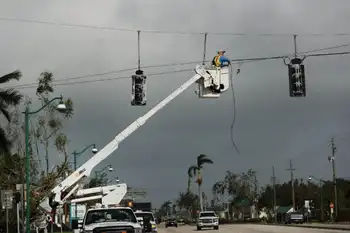Oil spill underlines AmericaÂ’s thirst for energy
It also highlights the policy tightrope that America must walk, as the world's greediest consumer of energy chases its dream of a future free from dependence on foreign oil, much of it from politically unstable parts of the world.
Some time this summer, the U.S. Senate will start consideration of the long awaited – and long overdue – climate and energy bill that is one of President Obama's top legislative priorities. The measure has many vital goals, among them a cut in overall consumption, an increase in cleaner renewable energy, a reduction in the emissions of greenhouse gases, improved efficiency standards, and a new impetus for the civil nuclear industry. But the bill cannot change reality at a single stroke.
Much fuss has been made of the country's first offshore commercial wind farm near Cape Cod in Massachusetts, for which the go-ahead finally came. For the foreseeable future, however, fossil fuels will continue to meet the bulk of U.S. energy needs. Savings can be made by higher fuel standards for vehicles, heating and air-conditioning systems. But if the annual oil import bill of over $500 billion is to be seriously reduced, alternate fossil fuel sources must be found at home. Mr Obama recognized as much last month when he opened parts of the Atlantic seaboard to new drilling. But as the Gulf spill indicates, every option carries a risk.
The most abundant and easily accessible fossil fuel in the U.S., coal, is also the most polluting – and as the recent mining tragedy in West Virginia shows can exert a heavy human toll. The country has reserves of shale oil that in theory could replace oil from the Middle East, but commercial extraction on the scale required carries vast environmental hazards. Much the same goes for shale gas, hailed by some optimists as the miracle answer to America's long-term energy problems.
An equal risk, however, is that the new spill will complicate prospects for the comprehensive energy bill, already at the mercy of a potential Republican filibuster. The accident must be thoroughly investigated. But it should not interfere with the most serious effort yet by Washington to confront the creeping U.S. energy crisis.
Related News

Ontario sending 200 workers to help restore power in Florida
TORONTO - Hurricane Irma has left nearly 7 million homes in the southern United States without power and two Ontario hydro utility companies are sending teams to help out.
Toronto Hydro is sending 30 staffers to aid in the restoration efforts in Tampa Bay while Hydro One said Sunday night that it would send 175 employees after receiving a request from Florida Power and Light.
“I've been on other storms down in the states and they are pretty happy to see you especially when they find out you're from Canada,” Dean Edwards, one of the Hydro One employees heading to Florida, told…





